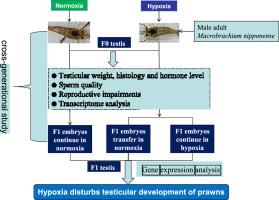Environmental Pollution ( IF 8.9 ) Pub Date : 2020-06-29 , DOI: 10.1016/j.envpol.2020.115093 Shengming Sun 1 , Yinxiang Chen 2 , Ran Hu 2

|
Recently, we reported that hypoxia disrupts the endocrine system and causes metabolic abnormalities in prawns. Although transgenerational impairment effects of hypoxia have become a hot topic in vertebrate, it is unknown whether hypoxia could exert cross-generational effects on testicular function crustaceans. The present study aimed to investigate hypoxia’s toxic effects on the testicular function of oriental river prawns (Macrobrachium nipponense) and offspring development. Hypoxia disrupted testicular germ cells quality, caused sex hormone imbalance (testosterone and estradiol), and delayed testicular development. The F1 generation derived from male prawns exposed to hypoxia showed retarded embryonic development, and reduced hatching success and larval development, despite not being exposed to hypoxia. Analysis of the transcriptome the F0 generation (exposed to hypoxia) showed that the impaired testicular functions were associated with changes to mitochondrial oxidative phosphorylation, apoptosis, and steroid biosynthesis. Interestingly, quantitative real-time PCR confirmed that hypoxia could significantly suppress the expression of antioxidant and gonad development-related genes in the testis of the F1 generations, with and without continued hypoxia exposures. In addition, paternal exposure to hypoxia could result in a higher production of reactive oxygen species in offspring testis tissue compared with those without hypoxia exposure. The cross-generational effects of testicular function implied that the sustainability of natural freshwater prawn populations would be threatened by chronic hypoxia.
中文翻译:

水生低氧干扰东方河虾(Macrobrachium nipponense)睾丸发育:跨代研究。
最近,我们报道了缺氧会破坏内分泌系统并导致虾代谢异常。尽管缺氧的跨代损伤作用已成为脊椎动物的热门话题,但缺氧是否能对睾丸功能甲壳类动物产生跨世代作用尚不清楚。本研究旨在探讨在东方河虾的睾丸功能缺氧的毒性作用(青虾)和后代的发展。缺氧破坏睾丸生殖细胞的质量,导致性激素失衡(睾丸激素和雌二醇),并延缓睾丸发育。尽管没有暴露于低氧条件下,来自暴露于低氧环境下的雄虾的F1代显示出胚胎发育受阻,孵化成功率和幼虫发育降低。对转录组F0代(暴露于低氧状态)的分析表明,睾丸功能受损与线粒体氧化磷酸化,细胞凋亡和类固醇生物合成的变化有关。有趣的是,定量实时PCR证实低氧可以显着抑制F1代睾丸中抗氧化剂和性腺发育相关基因的表达,无论是否持续暴露低氧。此外,与没有低氧暴露的人相比,父亲暴露于低氧可能会导致后代睾丸组织中更高的活性氧产生。睾丸功能的跨世代效应表明,慢性缺氧将威胁天然淡水虾种群的可持续性。



























 京公网安备 11010802027423号
京公网安备 11010802027423号